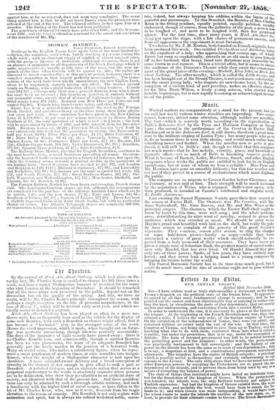Musical matters are comparatively at a stand for the present,
but (as we said last week) various winter novelties are impending. Two occur- rences, however, attract some attention, although neither are novelties. The first—which is scarcely worth recording—is the reproduction of Balfe's Bohemian Girl by the Pync and Harrison Company at
Lane ; the second is the performance of the Creation at Exeter H Hackneyed as ia the Bohemian-Girl, it still draws, thanks in a great mea- sure to the brilliant singing of Louisa Pyne ; but many people who go to it, do so because there is very little choice, and would much rather have something newer and fresher. When the novelty now in yells is pro- duced, it will still be Balfe's and, though we think that this composer has much merit—that he has melody, vivacity, grace, and knowlede of dramatic effect—yet so much of Balfa is becoming tot9hurs perdrix.. What is become of Barnett, Loder, Macfarren, Smart, and other English composers whose works the public are entitled to look for in an English operahouse, but of none of whom we hear a syllable ? Miss Pyne and Mr. Harrison have gone on smoothly hitherto ; but this fair weather will not last if they persist in a course of exclusiveness which must displease the public.
The company are to migrate to Covent Garden before Christmas, not in January, as was said at first. Their strength will be much increased by the acquisition of Weiss, who is engaged. Balfe's'new opera, to be then produced, is founded on Cazotte's celebrated and singular novel, Le Diable Anioureler.
Last evening the Sacred Harmonic Society gave their first concert of the season at Exeter Hall. The Oratorio was Tlw Creation, with Ma- dame Rudersdorff, Mr. Sims Reeves, and Mr. and Mrs. Weiss as the principal singers. The choruses, which the Exeter Hall choir ought to know by heart by this time, were well sung ; and the whole perform- ance, notwithstanding its utter want of novelty, seemed to please the audience, which was crowded as usual. We should be sorry to see Haydn's grand and, beautiful work laid on the shelf; but really the pub- lic have reason to complain of the poverty of this great Society's rilpertoire. They continue, season after season, to ring the changes on some half-dozen pieces—hardly so many—while they leave untouched a variety of great works which should naturally be ex- pected from a body possessed of their resources. They have never yet given a single note of Sebastian Bach, the greatest master of sacred music, save only Handel, that has ever lived. Of Handel himself they give only two or three pieces' Spohr' of late years, they have entirely neg- lected; and they never lend a helping hand to a young composer by bringing his talents before the world.
The Sacred Harmonic Society has in its time done much good, but it might do much more, and its sins of omission ought not to pass without notice.


























 Previous page
Previous page